| Listing 1 - 9 of 9 |
Sort by
|

ISBN: 0333771230 Year: 2000 Publisher: Basingstoke Macmillan
Abstract | Keywords | Export | Availability | Bookmark
 Loading...
Loading...Choose an application
- Reference Manager
- EndNote
- RefWorks (Direct export to RefWorks)
Environmental policy --- Rational choice theory --- Discourse analysis
Book
ISBN: 1134546521 113454653X 1299458661 0203189671 1280354410 9786610354412 0203133897 Year: 2000 Publisher: London : Routledge,
Abstract | Keywords | Export | Availability | Bookmark
 Loading...
Loading...Choose an application
- Reference Manager
- EndNote
- RefWorks (Direct export to RefWorks)
Rational Choice Theory is flourishing in sociology and is increasingly influential in other disciplines. Contributors to this volume are convinced that it provides an inadequate conceptualization of all aspects of decision making: of the individuals who make the decisions, of the process by which decisions get made and of the context within which decisions get made. The ciritique focuses on the four assumptions which are the bedrock of rational choice: rationality: the theory's definition of rationality is incomplete, and cannot satisfactorily incorporate norms and emotions individualism: rational choice is based upon atomistic, individual decision makers and cannot account for decisions made by ;couples', 'groups' or other forms of collective action process: the assumption of fixed, well-ordered preferences and 'perfect information' makes the theory inadequate for situations of change and uncertainty aggregation: as methodological individualists, rational choice theorists can only view structure and culture as aggregates and cannot incorporate structural or cultural influences as emergent properties which have an effect upon decision making. The critique is grounded in discussion of a wide range of social issues, including race, marriage, health and education.
Rational choice theory --- Social Change --- Sociology & Social History --- Social Sciences --- Rational choice theory.
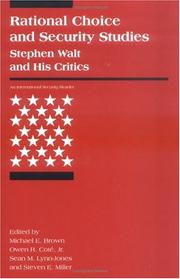
ISBN: 0262522756 9780262522755 Year: 2000 Publisher: Cambridge (Mass.): MIT Press,
Abstract | Keywords | Export | Availability | Bookmark
 Loading...
Loading...Choose an application
- Reference Manager
- EndNote
- RefWorks (Direct export to RefWorks)
Security, International --- Rational choice theory --- Walt, Stephen M., - 1955-
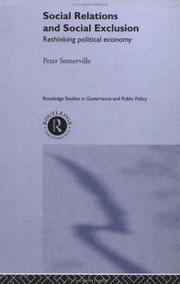
ISBN: 1280326352 9786610326358 0203184971 9780203184974 9780415240406 0415240409 9781134551453 9781134551491 9781134551507 Year: 2000 Publisher: New York Routledge
Abstract | Keywords | Export | Availability | Bookmark
 Loading...
Loading...Choose an application
- Reference Manager
- EndNote
- RefWorks (Direct export to RefWorks)
Examining the rational individual, this book develops a new approach to the theory of social relations. It explores how far we make sense of society on the assumption that people act as independent and free individuals, exercising rational choice. Re-examining the family, community, workplace and state, the author offers a thorough and original critique of the social policies of 'New Labour'.
Social institutions. --- Rational choice theory. --- Social choice --- Institutions, Social --- Social systems --- Sociology --- Social structure
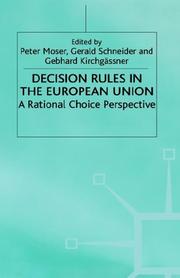
ISBN: 0333710797 Year: 2000 Publisher: Houndmills Basingstoke London Macmillan Press
Abstract | Keywords | Export | Availability | Bookmark
 Loading...
Loading...Choose an application
- Reference Manager
- EndNote
- RefWorks (Direct export to RefWorks)
Choix rationnel [Théorie du ] --- Keuzetheorie [Rationele ] --- Rational choice theory --- Rationele keuzetheorie --- 339.92 --- European Union --- -Rational choice theory --- #SBIB:35H411 --- #SBIB:327.7H220 --- Social choice --- Economische samenwerking en integratie. Tolunie --- Decision making --- Beleidscyclus: voorbereiding (inclusief planning) --- Europese Unie: instellingen en besluitvorming --- Rational choice theory. --- 339.92 Economische samenwerking en integratie. Tolunie --- E.U. --- Decision making. --- Union européenne
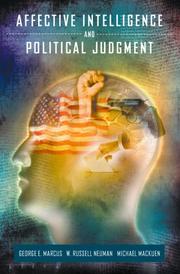
ISBN: 0226504697 0226504689 9780226504681 9780226504698 Year: 2000 Publisher: Chicago, Ill. University of Chicago Press
Abstract | Keywords | Export | Availability | Bookmark
 Loading...
Loading...Choose an application
- Reference Manager
- EndNote
- RefWorks (Direct export to RefWorks)
Politics --- Mass communications --- Political psychology --- Rational choice theory --- Voting --- Affect (Psychology) --- Political psychology. --- Rational choice theory. --- Voting. --- Affect (Psychology). --- #SBIB:324H20 --- #SBIB:324H60 --- Polls --- Mass political behavior --- Political behavior --- Political science --- Politics, Practical --- Psychology, Political --- Politologie: theorieën (democratie, comparatieve studieën….) --- Politieke socialisatie --- Psychological aspects --- Emotions --- Psychology --- Elections --- Social choice --- Suffrage --- Social psychology --- Balloting
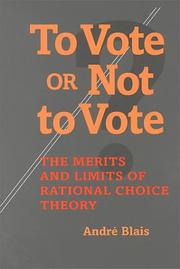
ISBN: 0822957345 0822941295 9780822941293 9780822957348 9780822990550 0822990555 1306553792 9781306553797 Year: 2000 Publisher: Pittsburgh, Pa. University of Pittsburgh Press
Abstract | Keywords | Export | Availability | Bookmark
 Loading...
Loading...Choose an application
- Reference Manager
- EndNote
- RefWorks (Direct export to RefWorks)
What makes people decide to vote? In addressing this simple question, André Blais examines the factors that increase or decrease turnout at the aggregate, cross-national level and considers what affects people's decision to vote or to abstain. In doing so, Blais assesses the merits and limitations of the rational choice model in explaining voter behavior. The past few decades have witnessed a rise in the popularity of the rational choice model in accounting for voter turnout, and more recently a groundswell of outspoken opposition to rational choice theory. Blais tackles this controversial s
Rational choice theory --- Voting --- #SBIB:011.AANKOOP --- #SBIB:324H42 --- #SBIB:32H3 --- Balloting --- Polls --- Elections --- Politics, Practical --- Social choice --- Suffrage --- Politieke structuren: verkiezingen --- Politieke wetenschappen: inleidende werken, handboeken, methoden --- Rational choice theory. --- Voting. --- Vote --- Choix rationnels, Théorie des --- Government - General --- Law, Politics & Government --- Political Institutions & Public Administration - General --- Théorie du choix rationnel --- Sciences politiques --- Elections et referendum
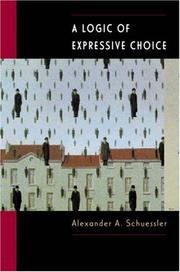
ISBN: 069100661X 0691006628 9780691006628 9780691006611 Year: 2000 Publisher: London : Princeton University Press,
Abstract | Keywords | Export | Availability | Bookmark
 Loading...
Loading...Choose an application
- Reference Manager
- EndNote
- RefWorks (Direct export to RefWorks)
Alexander Schuessler has done what many deemed impossible: he has wedded rational choice theory and the concerns of social theory and anthropology to explain why people vote. The "paradox of participation"--why individuals cast ballots when they have virtually no effect on electoral outcomes--has long puzzled social scientists. And it has particularly troubled rational choice theorists, who like to describe political activity in terms of incentives. Schuessler's ingenious solution is a "logic of expressive choice." He argues in incentive-based (or "economic") terms that individuals vote not because of how they believe their vote matters in the final tally but rather to express their preferences, allegiances, and thus themselves. Through a comparative history of marketing and campaigning, Schuessler generates a "jukebox model" of participation and shows that expressive choice has become a target for those eliciting mass participation and public support. Political advisers, for example, have learned to target voters' desire to express--to themselves and to others--who they are. Candidates, using tactics such as claiming popularity, invoking lifestyle, using ambiguous campaign themes, and shielding supporters from one another can get out their vote even when it is clear that an election is already lost or won. This important work, the first of its kind, will appeal to anyone seeking to decipher voter choice and turnout, social movements, political identification, collective action, and consumer behavior, including scholars, graduate students, and upper-level undergraduates in political science, economics, sociology, anthropology, and marketing. It will contribute greatly to our understanding and prediction of democratic participation patterns and their consequences.
Rational choice theory --- Voting --- Political participation --- Rational choice theory. --- Social choice --- Ansolabehere, Stephen. --- Appadurai, Arjun. --- Bartels, Larry. --- Bonaccorso, John. --- Brennan, Geoffrey. --- Carter, Jimmy. --- Clinton, Bill. --- Diamond, Edwin. --- Durkheim, Emile. --- Edelman, Murray. --- Eisenhower, Dwight D. --- Ferejohn, John. --- Giddens, Anthony. --- Goodman, Robert. --- Haug, Wolfgang. --- Herbst, Susan. --- Hotelling, Harold. --- Iyengar, Shanto. --- Jamieson, Kathleen Hall. --- Johnson, Lyndon. --- King, Gary. --- Lennon, John. --- Lennons Problem. --- Lifestyle. --- Mickelson, Sig. --- Nagler, Jonathan. --- Nixon, Richard. --- Olson, Mancur. --- Page, Benjamin. --- Riker, William. --- Scib. --- Tedlow, Richard. --- Verba, Sidney. --- Walker, Mary. --- Wright, Gerald. --- abstention. --- bandwagons (momentum). --- biographical narratives. --- chaos theorem. --- commodification. --- composition of utility. --- electoral campaigns. --- expressive tipping model. --- free-riding. --- identity (attachment). --- marketing. --- opinion polls. --- paradox of participation. --- participation costs. --- public goods. --- rational ignorance. --- selective incentives. --- snob-good. --- turnout. --- Voting. --- Political participation. --- Balloting --- Polls --- Elections --- Politics, Practical --- Suffrage --- Citizen participation --- Community action --- Community involvement --- Community participation --- Involvement, Community --- Mass political behavior --- Participation, Citizen --- Participation, Community --- Participation, Political --- Political activity --- Political behavior --- Political rights --- Social participation --- Political activists
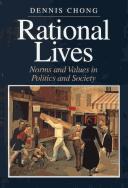
ISBN: 1283078309 9786613078308 0226104370 9780226104379 0226104389 9780226104386 0226104397 9780226104393 9781283078306 6613078301 Year: 2000 Publisher: Chicago, Ill. University of Chicago Press
Abstract | Keywords | Export | Availability | Bookmark
 Loading...
Loading...Choose an application
- Reference Manager
- EndNote
- RefWorks (Direct export to RefWorks)
Those who study value conflicts have resisted rational choice approaches in the social sciences, contending that political conflict over cultural values is best explained by group loyalties, symbolic motives, and other "nonrational" factors. However, Chong shows that a single model can explain how people make decisions across both social and economic realms. He argues that our preferences result from a combination of psychological dispositions, which are shaped by social influences and developed over the life span. Chong's book yields insights about the circumstances under which preferences, beliefs, values, norms and group identifications are formed. It offers a provocative explanation of how ingrained social norms and values can change over time despite the forces maintaining the status quo. "Going beyond the tired polemics on both sides, [Chong] constructs a new interpretation of human behavior in which culture and individual rationality both matter. The synthesis is a more comprehensive and powerful explanatory framework than either side could have produced, and Chong's creativity should influence subsequent interpretations of our social life in fundamental ways."-Christopher H. Achen, University of Michigan
Rational choice theory. --- Political psychology. --- Political sociology. --- Mass political behavior --- Political behavior --- Political science --- Sociology --- Politics, Practical --- Psychology, Political --- Psychology --- Social psychology --- Social choice --- Sociological aspects --- Psychological aspects --- norms, values, politics, political, society, social studies, rationality, conflict, value, choice, sciences, culture, cultural, explanation, loyalty, groups, cliques, symbolic, motivation, motives, nonrational, economic, decision, preference, psychological, life span, beliefs, identification, status quo, polemics, interpretation, human, incentives, conformity.
| Listing 1 - 9 of 9 |
Sort by
|

 Search
Search Feedback
Feedback About UniCat
About UniCat  Help
Help News
News